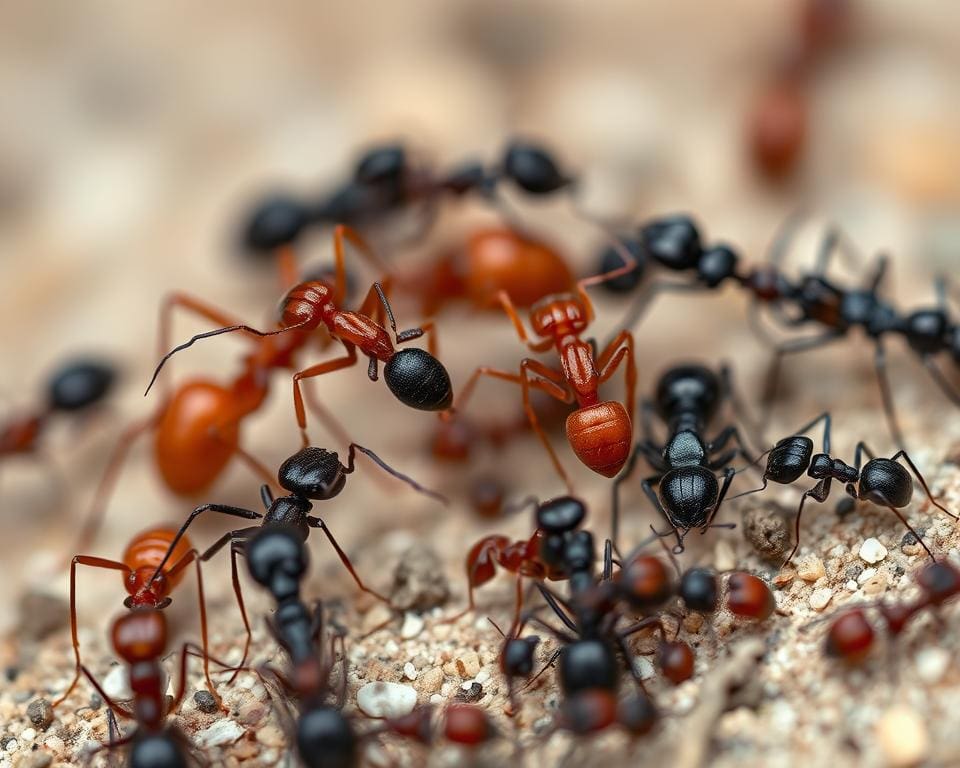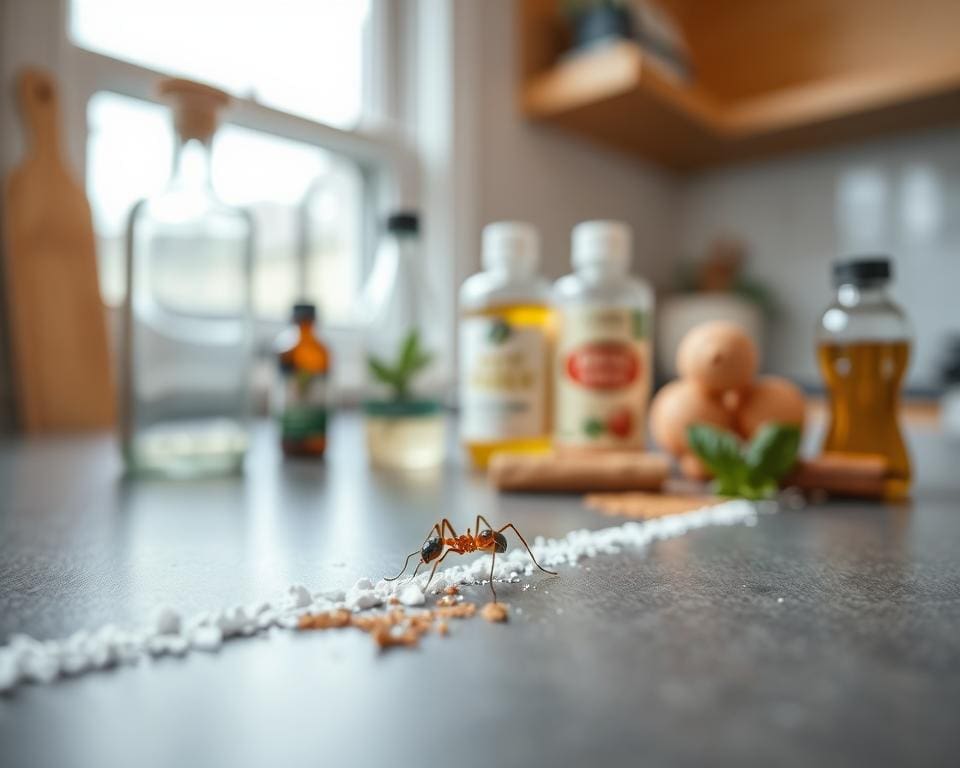Ants can be a persistent nuisance in many households, invading our living spaces and disrupting our peace. Understanding what stops ants from coming in the house is crucial for homeowners looking to maintain a comfortable environment. By preventing ant infestations, we not only protect our homes but also enhance our quality of life. This article aims to explore effective ant repellent methods that will empower you to reclaim your space and deter these tiny invaders naturally and efficiently.
Understanding Ant Behaviour and Attraction
Ants are fascinating insects, with a diverse range of species found in the UK. Each species exhibits unique characteristics and behaviours that drive their attraction to human environments. To effectively manage their presence, it is essential to grasp the common types of ants that infiltrate homes and the reasons behind their invasion.
Common Types of Ants Found in Homes
Several common types of ants frequently make their way into households. Understanding these species provides valuable insight into their behaviour:
- Black Garden Ant (Lasius niger): Recognised for their small black bodies, these ants are often found in gardens and can enter homes in search of food.
- Pharaoh Ant (Monomorium pharaonis): Known for their light yellow-brown colour, these ants are notorious for nesting indoors, thriving in warmer environments.
- Carpenter Ant (Camponotus spp.): Specialising in wood, these larger ants can cause damage to homes by creating nests within wooden structures.
Why Ants Enter Homes
Several factors contribute to ant attraction and their decision to invade domestic spaces. Key reasons include:
- The search for food, particularly sugary or protein-rich substances.
- Desire for shelter, particularly during cold months or adverse weather.
- Availability of ideal nesting conditions in unnoticed corners and crevices.
Understanding ant behaviour provides individuals an upper hand in preventing these pests from becoming unwelcome house guests.

What Stops Ants From Coming In The House
Keeping ants at bay requires a combination of practical measures and proactive habits. Understanding the importance of sealing entry points and maintaining cleanliness goes a long way in creating an unfriendly environment for these pests. Ants often seek safe passages into homes, motivated by food sources and shelter. By addressing these two critical areas, homeowners can significantly reduce ant infestations.
Sealing Entry Points
One of the most effective strategies in combating ant invasions is sealing entry points. Gaps and cracks around windows, doors, and foundations serve as invitations for ants into your home. Using materials such as caulk, door sweeps, and weather stripping can help secure these vulnerabilities. Regularly inspecting and repairing these areas provides a solid defence against what stops ants from entering.
Importance of Cleanliness
Cleanliness acts as a potent deterrent against ant incursions. Keeping kitchens and dining areas tidy limits accessible food sources, diminishing the appeal for ants. Adopting good practices such as proper food storage in airtight containers and timely disposal of waste helps maintain cleanliness as deterrent. By ensuring that crumbs and spills are promptly cleaned, homeowners can create an environment less hospitable to these unwelcome visitors.
Effective Ant Barriers to Prevent Entry
Homeowners seeking to repel ants can explore a range of effective ant barriers. Understanding both natural ant control methods and chemical ant repellents is essential for creating a harmonious living space free from unwanted pests.
Using Natural Ant Control Methods
Natural ant control methods provide an excellent starting point for those looking to combat ant invasions without harmful chemicals. Options such as diatomaceous earth serve as a barrier that disrupts the ant’s exoskeleton. Essential oils like peppermint and tea tree oil not only emit pleasant scents but also deter ants when used in solutions. Vinegar solutions are another effective method; spraying a mixture of equal parts vinegar and water around entry points disrupts ants’ scent trails, making it difficult for them to navigate.
Chemical Ant Repellents: Pros and Cons
Chemical ant repellents can offer quick and effective results, making them a popular choice among homeowners. These products often contain active ingredients that halt ant activity upon contact. Although effective, these repellents come with potential drawbacks. Risks to pets and children are significant factors to consider, as exposure to certain chemicals may lead to health issues. It’s crucial to weigh the benefits against the possible hazards when selecting chemical options for ant control.
Household Ant Deterrents You Can Make
Creating your own household ant deterrents can lead to effective and natural solutions for keeping unwanted visitors at bay. With simple ingredients often found in your kitchen, you can craft DIY ant sprays and home remedies that not only deter ants but also promote a healthier living environment. Here are some practical strategies.
DIY Ant Sprays Using Household Ingredients
Crafting DIY ant sprays using common household ingredients can be an empowering and cost-effective approach. Try mixing:
- 1 part water with 1 part dish soap to create a powerful spray that disrupts ants’ ability to communicate and clean themselves.
- A mixture of water and a few drops of peppermint essential oil, a natural repellent that ants find unpleasant.
- Equal parts vinegar and water, which can help remove scent trails left by ants.
These DIY ant sprays can be applied directly to infested areas, providing an effective barrier against intruders.
Home Remedies for Ant Prevention
In addition to DIY ant sprays, there are various home remedies for ants that can help deter these pesky insects. Consider using:
- Cinnamon, sprinkled around entry points, which acts as a barrier due to its strong scent.
- Cayenne pepper, which can interfere with ant trails, making it harder for them to find food.
- Used coffee grounds, scattered around the garden or entryways, which can repel ants while providing an eco-friendly solution.
Employing these home remedies for ants not only helps with prevention but also promotes a more natural pest management approach.
Ant-Proofing Tips for Your Home
Implementing effective ant-proofing tips is essential for maintaining a pest-free environment. By applying outdoor strategies and creating barriers, homeowners can significantly reduce the likelihood of an ant invasion. This section offers practical advice on how to fortify your property against these persistent pests.
Outdoor Strategies to Keep Ants Away
Landscaping choices play a crucial role in deterring ants. Consider using plants that naturally repel ants, such as mint or lavender. Maintaining a tidy garden and avoiding excessive mulch can further reduce their attraction to your yard. Placing barriers such as gravel or stones around flowerbeds creates an unfavourable terrain for ants to traverse.
Creating a Barrier Around Your Property
Physical barriers serve as a first line of defence against ants. Ensure that the zone around your home’s foundation is clear of debris and vegetation, which can serve as highways for ant colonies. Strategically positioning ant bait stations can intercept foraging ants before they enter your home. This comprehensive approach, combining outdoor vigilance with indoor cleanliness, reinforces your efforts in keeping ants at bay.
Minimising Ant Entry Points in Homes
To create a strong defence against unwanted guests, it is crucial to focus on minimising entry points in your home. Regular inspections of your property, from roofs to basements, can uncover vulnerabilities that may allow ants to invade. Ensure that window screens are intact, and doors close properly to eliminate gaps that these clever creatures could exploit. Emphasising proactive maintenance plays a vital role in preventing ant infestations.
Furthermore, consider the impact of landscape maintenance on your home’s outer perimeter. Trim back shrubs and trees that touch your structure, as these can serve as bridges for ants seeking food and shelter. Implementing effective ant barriers, such as physical obstructions or natural repellents around your foundations, can significantly deter ants from establishing colonies near your home.
By adopting a mindset focused on minimising entry points, you empower yourself to maintain a pest-free environment. The cumulative efforts of regular checks and thoughtful landscaping will go a long way in preventing ant infestations. Create a sanctuary within your home that not only deters ants but fosters peace of mind, allowing you to enjoy your living space without the worry of unwanted visitors.









